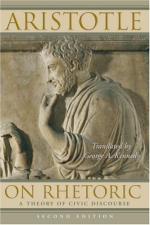
|
| Name: _________________________ | Period: ___________________ |
This test consists of 5 short answer questions, 10 short essay questions, and 1 (of 3) essay topics.
Short Answer Questions
1. In Aristotle's description of fear, what was the opposite of fear?
2. In Aristotle's opinion, which things did a criminal consider when choosing their victim?
3. When did Aristotle think "what is good" made one happy?
4. What did Aristotle say could not be considered good?
5. According to Aristotle in Book I, Chapter 1, what was not a concern of rhetoric?
Short Essay Questions
1. What distinction did Aristotle make between war and peace and national defense as subjects of political oratory?
2. Which ways should the political rhetorician consider the degree of goodness in forming a convincing argument?
3. What did oaths add to legal rhetoric?
4. What was the logical appeal that Aristotle referred to and when would it be used?
5. According to Aristotle, what had to happen in order for a person to be shameful or shameless?
6. Which points of view could the law be observed by a legal rhetorician?
7. What was Aristotle's description of the ethical appeal in rhetoric?
8. What were some of the aspects of anger and calmness that Aristotle discussed in the book?
9. Which causes of human action did Aristotle outline in Book I, Chapter 10, and which ones were voluntary?
10. In what way were contracts used by a legal rhetorician?
Essay Topics
Write an essay for ONE of the following topics:
Essay Topic 1
Legal rhetoric was a main form of speech for courts and trials in Aristotle's time.
1) Describe the similarities and differences between the two types of law: the special and the general.
2) Explain Aristotle's definition of wrongdoing.
3) Analyze how both laws applied to wrongdoing and legal rhetoric.
Essay Topic 2
Define narration as it is used in rhetoric or in a speech, including an explanation of which forms of rhetoric were most likely to use narration and why, and the similarities and differences between narration in literature and narration in speaking.
Essay Topic 3
The Introduction of a speech set the stage for the points and arguments it was designed to deliver.
1) Describe the two main purposes for an introduction.
2) Explain the techniques used in an effective introduction.
3) Analyze the situations that Aristotle thought an introduction would work the best and why.
|
This section contains 906 words (approx. 4 pages at 300 words per page) |

|




